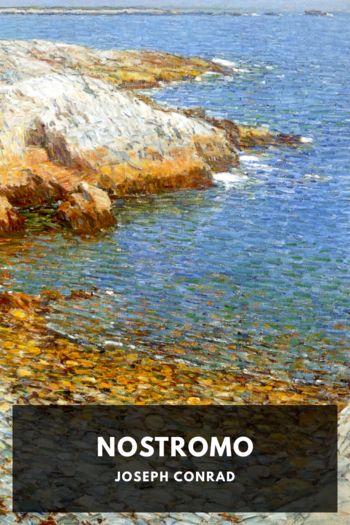Nostromo - Joseph Conrad (books to read fiction .TXT) 📗

- Author: Joseph Conrad
Book online «Nostromo - Joseph Conrad (books to read fiction .TXT) 📗». Author Joseph Conrad
The Excelentisimo (“the hope of honest men,” as Don Jose had addressed him in a public speech delivered in the name of the Provincial Assembly of Sulaco) sat at the head of the long table; Captain Mitchell, positively stony-eyed and purple in the face with the solemnity of this “historical event,” occupied the foot as the representative of the O.S.N. Company in Sulaco, the hosts of that informal function, with the captain of the ship and some minor officials from the shore around him. Those cheery, swarthy little gentlemen cast jovial side-glances at the bottles of champagne beginning to pop behind the guests’ backs in the hands of the ship’s stewards. The amber wine creamed up to the rims of the glasses.
Charles Gould had his place next to a foreign envoy, who, in a listless undertone, had been talking to him fitfully of hunting and shooting. The well-nourished, pale face, with an eyeglass and drooping yellow moustache, made the señor administrador appear by contrast twice as sunbaked, more flaming red, a hundred times more intensely and silently alive. Don Jose Avellanos touched elbows with the other foreign diplomat, a dark man with a quiet, watchful, self-confident demeanour, and a touch of reserve. All etiquette being laid aside on the occasion, General Montero was the only one there in full uniform, so stiff with embroideries in front that his broad chest seemed protected by a cuirass of gold. Sir John at the beginning had got away from high places for the sake of sitting near Mrs. Gould.
The great financier was trying to express to her his grateful sense of her hospitality and of his obligation to her husband’s “enormous influence in this part of the country,” when she interrupted him by a low “Hush!” The president was going to make an informal pronouncement.
The Excelentisimo was on his legs. He said only a few words, evidently deeply felt, and meant perhaps mostly for Avellanos—his old friend—as to the necessity of unremitting effort to secure the lasting welfare of the country emerging after this last struggle, he hoped, into a period of peace and material prosperity.
Mrs. Gould, listening to the mellow, slightly mournful voice, looking at this rotund, dark, spectacled face, at the short body, obese to the point of infirmity, thought that this man of delicate and melancholy mind, physically almost a cripple, coming out of his retirement into a dangerous strife at the call of his fellows, had the right to speak with the authority of his self-sacrifice. And yet she was made uneasy. He was more pathetic than promising, this first civilian chief of the state Costaguana had ever known, pronouncing, glass in hand, his simple watchwords of honesty, peace, respect for law, political good faith abroad and at home—the safeguards of national honour.
He sat down. During the respectful, appreciative buzz of voices that followed the speech, General Montero raised a pair of heavy, drooping eyelids and rolled his eyes with a sort of uneasy dullness from face to face. The military backwoods hero of the party, though secretly impressed by the sudden novelties and splendours of his position (he had never been on board a ship before, and had hardly ever seen the sea except from a distance), understood by a sort of instinct the advantage his surly, unpolished attitude of a savage fighter gave him amongst all these refined Blanco aristocrats. But why was it that nobody was looking at him? he wondered to himself angrily. He was able to spell out the print of newspapers, and knew that he had performed the “greatest military exploit of modern times.”
“My husband wanted the railway,” Mrs. Gould said to Sir John in the general murmur of resumed conversations. “All this brings nearer the sort of future we desire for the country, which has waited for it in sorrow long enough, God knows. But I will confess that the other day, during my afternoon drive when I suddenly saw an Indian boy ride out of a wood with the red flag of a surveying party in his hand, I felt something of a shock. The future means change—an utter change. And yet even here there are simple and picturesque things that one would like to preserve.”
Sir John listened, smiling. But it was his turn now to hush Mrs. Gould.
“General Montero is going to speak,” he whispered, and almost immediately added, in comic alarm, “Heavens! he’s going to propose my own health, I believe.”
General Montero had risen with a jingle of steel scabbard and a ripple of glitter on his gold-embroidered breast; a heavy sword-hilt appeared at his side above the edge of the table. In this





Comments (0)